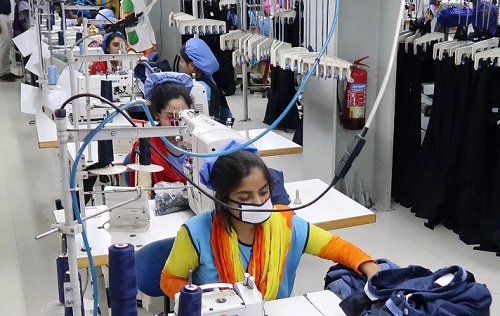DESPITE GOVERNMENT AID, ASIAN GARMENT WORKERS LOST JOBS, SEE WAGE CUTS: REPORT

DESPITE GOVERNMENT AID, ASIAN GARMENT WORKERS LOST JOBS, SEE WAGE CUTS: REPORT
Working conditions for garment workers were already under distress pre-COVID. The pandemic has worsened the situation with wage thefts across Asian garment factories rising, says a new report by the Asia Floor Wage Alliance (AFWA). The report states, predatory purchasing practices adopted by brands during the pandemic has forced many suppliers to lower production costs besides accepting unstable offers and delayed payments. Around l 2,185 employees employed in 189 factories in six countries including Sri Lanka, Pakistan, Indonesia, India, Cambodia and Bangladesh, have faced wage thefts during the period.
Bangladesh sees 60 per cent wage drop
As per a MDS report, world’s second largest garment producer, Bangladesh is one of the most affected countries by the pandemic. Bangladesh generates almost 11 per cent of its GDP from the fashion industry and employs 4.4 million workers. The country reported a 60 per cent decline in minimum wages last year due to the pandemic. The laid off workers had to rely on debts to satisfy their basic needs such as food, housing or health services. Around 28 per cent these workers were unable to find any other jobs. They have also not received any financial relief from the government.
Bangladesh has also not renewed its Agreement on Fire and Building Safety, which expired this year. This is compelling workers to work with bare minimum wages and in unsafe working conditions.
minimum wages and in unsafe working conditions.
High job loss in India
With a worker base of 45 million direct and 60 million indirect employees in the textile and garment industry, India suffered one of the largest lockdowns imposed. This led to a 73 per cent decline in workers’ wages with companies failing to pay $29.67 million in wages and $5.3 million in bonuses. Around 88 per cent workers in the industry have lost their jobs.
Wage gap in Cambodia widens
Value chain disruptions in China and reduced consumption in the US and EU led to 72 per cent Cambodian garment workers losing their jobs. Some also faced wage cuts or temporary wage suspensions. Wage gap between male and female workers widened to 21 per cent by the end of the year from 12 per cent before the pandemic.
Pakistan workers see wage cuts
Workers’ wages in Pakistan declined 29 per cent in 2020. The country also laid off 81 per cent garment workers during the year. Workers, who succeeded in retaining their jobs, faced 5 per cent decline in monthly wages. Factories failed to pay $85.08 million in wages due to order cancellations and failed payments by brands. Most women garment workers were forced to take up extremely poorly paid jobs that roughly provided $2-3 per day. Others had to work for longer hours and also faced increased verbal and mental harassment.
No aid for COVID-positive workers in Sri Lanka
Since the outbreak, Sri Lanka has fired almost 96 per cent its garment workers. Of this, 85 per cent have not received any compensation from the government leading to 78 per cent of them falling below the poverty line between March and May 2020. Workers’ debts in the country rose from $6 a month per employee before the pandemic to $17 month in April this year. Around 94 per cent workers were paid 23 per cent less wages between March and December 2020 than in January and February 2020
COVID-19 outbreak also deteriorated the working conditions of Sri Lanka’s garment factory employees. Over thousand employees at the Brandix Lanka factory in Minuwangoda, who, tested COVID positive in October, faced physical violence and mistreatment from the government and the military.
Indonesia workers seek debts to cover basic needs
Order cancellations and raw material shortage led to loss of jobs for 72 per cent of Indonesia’s garment workers. Around 81,633 workers stopped earning $20.02 million in wages leading to 70 per cent of them getting into debt to cover basic needs. The garment labor sector is yet to recover from the pandemic effect. Though, 95 per cent laborers in the industry have received government assistance, they are still struggling to meet their basic needs, says the AFWA report.
By Fashionating World
https://www.fashionatingworld.com/new1-2/despite-government-aid-asian-garment-workers-lost-jobs-see-wage-cuts-report
